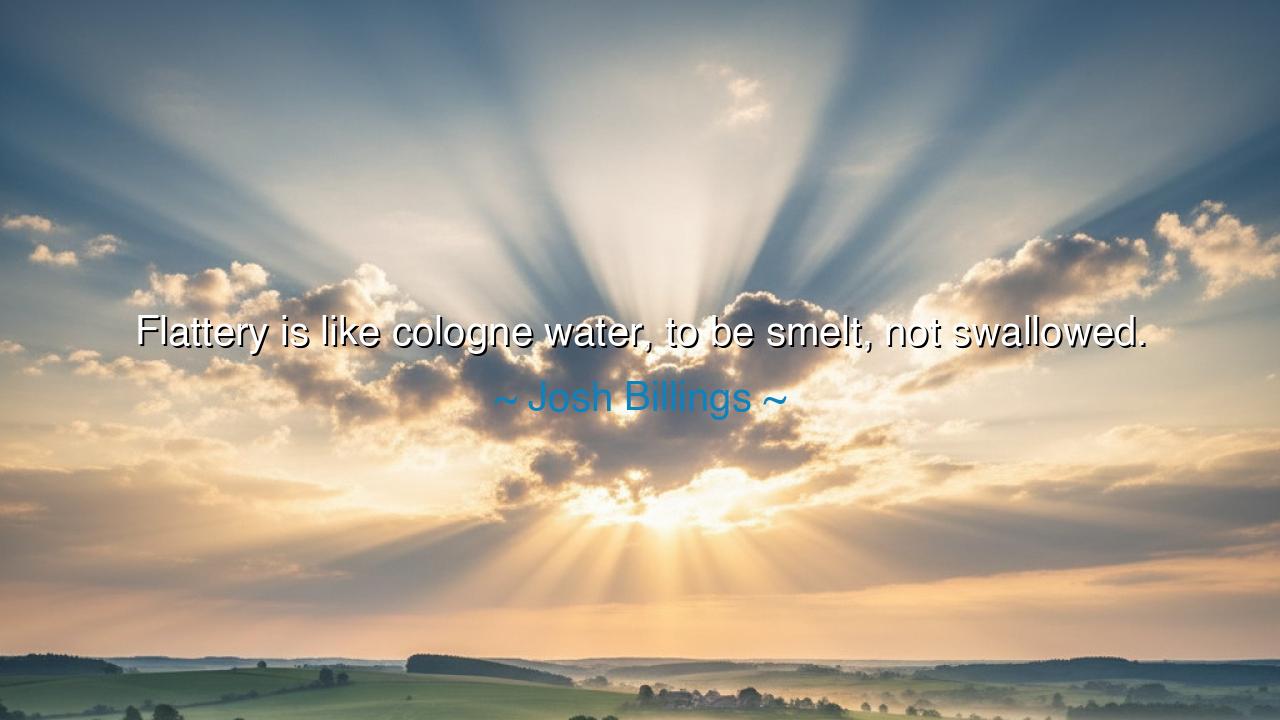
Flattery is like cologne water, to be smelt, not swallowed.






“Flattery is like cologne water, to be smelt, not swallowed.” — Josh Billings
In this vivid and wise observation, Josh Billings, the American humorist and philosopher of plain speech, distills an ancient truth into a single fragrant image. His words compare flattery — the sweet and often dangerous art of false praise — to cologne water, a pleasant scent meant to be enjoyed lightly but never ingested. To smell flattery is to recognize and appreciate a kind word without letting it intoxicate the soul; to swallow it is to lose reason, to mistake empty admiration for genuine worth. In this one sentence, Billings captures the eternal struggle of pride and humility — the balance between accepting kindness and rejecting vanity.
The ancients knew this truth well. The wise men of Greece warned that the flatterer was more dangerous than the enemy, for the enemy wounds the body, but the flatterer corrupts the soul. Aristotle called flattery a “disgraceful imitation of friendship,” and Plutarch devoted an entire essay to teaching rulers how to discern between the honest adviser and the sycophant. Billings, in his homespun humor, revives that same wisdom for a new age. His “cologne water” is but a modern metaphor for what the ancients knew — that sweet words, like perfume, are delightful when kept at a distance, but poisonous when consumed.
Flattery, unlike true praise, serves not truth but manipulation. The flatterer’s weapon is not steel, but sugar-coated deceit. He studies the weaknesses of others — pride, vanity, insecurity — and offers them a mirror polished with lies. History is full of great men who fell not to their enemies, but to their admirers. Consider the tale of Emperor Nero, who surrounded himself with flatterers who praised his art, his voice, his divinity. They fed his ego until it devoured his sanity, and Rome burned for it. The scent of flattery became his addiction, and what should have been a whiff of affirmation became a deadly draught of delusion. Thus, as Billings warns, to swallow flattery is to poison one’s sense of reality.
Yet Billings does not counsel cynicism. He does not say, “Reject all praise,” but rather, “Know how to receive it.” To smell flattery is to allow it to pass through the senses without corrupting the heart. The one who knows his worth does not need the lies of others to feel whole. He may smile when praised, but he is not blinded by it. In this way, Billings’ wisdom carries a gentler message — that modesty is not self-denial, but self-awareness. It is the discipline of the strong to enjoy beauty without possession, to taste sweetness without gluttony, and to hear praise without pride.
There is a story of Abraham Lincoln that mirrors this wisdom. A man once wrote him an exaggerated letter of admiration, calling him the “savior of the nation.” Lincoln replied simply, “I am only trying to do my duty.” He accepted the kind words, but did not swallow them. He understood that the moment he began to believe in his own myth, he would cease to serve his purpose. Like Billings’ cologne, the scent of admiration passed him by, pleasant but fleeting. And so he remained humble — a leader who breathed praise but was not consumed by it.
The origin of this quote reflects Billings’ larger philosophy. Born in the 19th century, he spoke in the voice of rural America — plain, humorous, and filled with common sense. He saw how ambition and vanity lured people away from sincerity, and he sought to remind them of the old virtues: honesty, humility, and wisdom. His words, though wrapped in humor, carry the same gravity as those of the sages. He teaches that wisdom is not the rejection of joy, but the moderation of it — that even the pleasant things of life, like perfume, must be handled with care.
So, my child, take this teaching to heart: beware of flattery, whether it comes from others or from your own reflection. When praised, smile, but stay steady. When admired, be grateful, but stay humble. Let praise be to you as cologne — a fragrance to lighten the air, not a potion to drink. For the one who drinks of it becomes drunk on illusion, while the one who merely breathes it remains free. Learn to tell the difference between the voice of truth and the whisper of vanity. Seek honest counsel, and cherish those who dare to correct you more than those who only applaud you.
And when you yourself give praise, let it be pure, not flattery. Speak truth, not manipulation. For sincere words, though less sweet, last longer. Remember always what Billings meant — that to live wisely is to savor life without being enslaved by it, and to accept kindness without losing one’s clarity. Let others anoint themselves in flattery if they must; but you, my child, breathe deeply, smile gently, and then move on — leaving the air fragrant, but your spirit uncorrupted.






AAdministratorAdministrator
Welcome, honored guests. Please leave a comment, we will respond soon